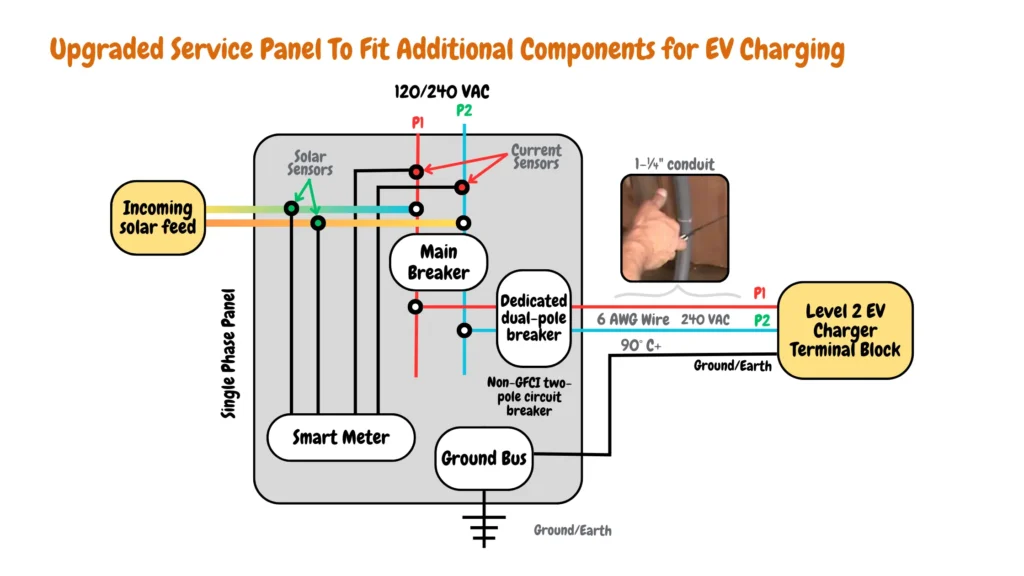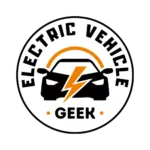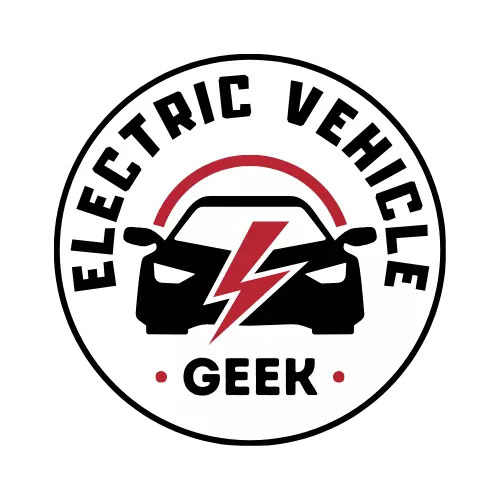One of the reasons why you might have a high EV charger installation quote might be due to a service panel upgrade. An EV charger installer will suggest an upgrade of your service panel if the existing service panel cannot support the EV charger installation.
Installing an EV charger requires an electrical panel that is working safely, and can protect against electrical overloads and short circuits, the electrical panel should also be big enough to support additional electrical components required during an EV charger installation, such as smart meters, dedicated circuits, GFCI protection devices, Surge Protection devices, wires and other accessories.
Table of Contents
Service Panel Upgrade for EV Charger Installation
Some of the reasons why a licensed electrician might need to upgrade your electrical panel include:
Upgrade Your Old Electrical Service Panel
If your home features an outdated electrical panel, it may be necessary to upgrade to a modern service panel capable of accommodating the substantial power demands of an EV charger. An electrician will recommend an upgrade after assessing various components of the existing panel, including safety switches, circuit breakers, fuses, and wiring, as well as evaluating the panel’s size, to ensure it can adequately support the increased load necessitated by an EV charger.
Some homes might also have an outdated switchboard that might be inefficient especially when considering integrating renewable energy electrical components that require newer switchboards to improve energy distribution and support EV charging electrical components that will work hand in hand with the EV charger to prevent electricity overloading, blown fuses, tripped breakers, or even fires when adding an EV charger.
Increased Load Capacity Close to 80% Safe Limits.
Installing an EV charger and other EV charging accessories might increase the electrical loads on your home electrical set-up causing panel trips due to overload or short circuit, you might need an electrical panel upgrade to meet safety standards and load accommodation that will support the heavy EV charging load requirements or also perform a load shedding to accommodate additional load of the EV charger.
Choosing The Right Breaker For EV Charger Installation
Installing EV chargers will require installing up to 100 amps panel, with Level 1 EV chargers requiring 120V AC, 15A electrical panels, Level 2 EV chargers requiring 240V AC, 50A or higher, and Level 3 EV chargers requiring DC 400+ Volts, 100+ Amps.
It’s important to note that the total capacity of your electrical panel is shared among other electrical appliances such as lights, air conditioning, etc that is why we recommend making sure you perform a load calculation to determine your current and future power usage. After calculating your power usage you will need a panel upgrade if your power usage exceeds 80% of the electrical panel capabilities.
Service Panel Assessment for EV Charger Integration:
After calculating your load requirements, an electrician might suggest upgrading an old less than 100 amps breaker panel to an 200 amps breaker panel to accommodate EV charging components to allow for future upgrades to your electrical systems.
Most modern homes have an 100 amps breaker panel, unfortunately, install a Level 2 EV charger that has 40-50 amps dedicated breakers, and also accommodate your other electrical home appliances and give room for future electrical load requirements.
Older switchboards often lack compatibility with the communication protocols used by smart devices, leading to glitches and frustration. Additionally, they might not play well with newer equipment, causing inefficiency and potential safety concerns. A modern panel ensures smooth communication with your smart EV charger and home energy system, prioritizes safety with current standards, and provides the detailed power tracking you need for informed energy management.
While it might seem like an extra step, a service panel upgrade unlocks the full potential of your smart home and ensures a safe, efficient electrical system for years to come.
Your Service Panel Doesn’t Have Enough Space
One of the major reasons for service panel upgrades is the space requirements required for EV charger installations, especially for EV chargers that require complex electrical components installed in the breaker panel for smart EV charging, bi-directional EV Charging, and Solar EV charging.

Upgrading to a bigger service panel will give room to various RCD switches, circuit breakers, fuses, wiring, surge protection devices, Ground Fault Circuit Interrupter (GFCI) Protection devices, smart meters, and dedicated circuits and wiring for the EV charger.
Conclusions.
Considering an Electrical Panel Upgrade offers numerous advantages, including heightened safety measures against overloads and fire risks, provision of additional circuits for high-demand appliances, future-proofing your home for upcoming technological advancements like more EVs and smart home devices, and ultimately, enhancing your home’s market value for potential buyers.

James Ndungu is a certified EV charger installer with over five years of experience in EVSE selection, permitting, and installation. He holds advanced credentials, including certification from the Electric Vehicle Infrastructure Training Program (EVITP) and specialized training in EV charging equipment and installation, as well as diplomas in EV Technology and Engineering Fundamentals of EVs. Since 2021, James has tested dozens of EV chargers and accessories, sharing expert insights into the latest EV charging technologies.







